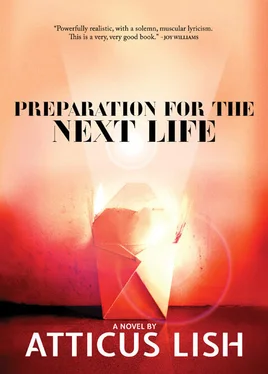As he reached the corner, he broke into a jog because he was hearing sirens.
Sirens were distinctly audible, there was no doubt.
He ran across the open vapor-lit space of the avenue to the black trees and the tracks and rocks on the other side.
A short sturdy man walking on the other side of the avenue stopped when he saw Skinner running at him out of nowhere, backed up and put his hands up.
Skinner ran by without looking at him, the pistol projecting from the end of his heavy forearm, his shins like broom handles going into his boots, picking them up and dropping them down, running, showing fatigue, a lack of coordination as if he might trip and fall. His damp black t-shirt was flapping on him, his close-cropped head turned sideways gazing in the direction of the racing sirens and the red and white sparks that were appearing down the avenue.
After Skinner ran by, the man lowered his hands and made a wide berth around the area of darkness covered over by black trees into which Skinner had disappeared.
The sirens got louder and louder and louder and more powerful until they had ballooned into whooping shock waves, and you could hear the engines and feel the tremor in the blacktop as the police cars climbed nearer along a parabolic arc through the intervening trees. The first speeding cruiser arrived in seconds, its electronic siren deafening, and pivoted and turned on 158 thStreet. Another cop car came streaking down through the dark from Bayside. More were coming now. Red lights whap-whapped on the houses and the man’s face, watching them arrive.
Very soon, the street was full of police cars, too many for them to turn and they began stopping on the avenue. The officers jumped out and ran on foot towards the location, their belt gear bouncing, hands over their holsters. You heard their keys when they ran. Some walked purposefully.
How many were there? someone yelled. Did you see him go?
Away from the epicenter, Mexicans could be seen in doorways looking out, silent faces cast in the red glow, which alternated rhythmically with darkness.
The man standing on the train-track side of the avenue was noticed by an experienced gray-haired cop.
You see something?
The man nodded, Sí, and pointed back into the tracks.
THE POLICE MOVED THEIR cars and waved the paramedics in.
The house is clear! Come on! they yelled.
They badly wanted to save somebody’s life.
But, upstairs, Jimmy had been found with brain matter outside his skull. The cops who met the paramedics coming up the stairs said, Don’t bother.
Really?
As in really.
They turned around and left.
For Jimmy, the detectives were called. Distinguished-looking men, they came in suits and porkpie hats. One wore a lavender handkerchief in his pocket. They made the climb up to the bedroom.
Jimmy had been killed face-down. One of the detectives wanted to turn the corpse over to see him. A digital picture was taken.
If the corpse was a man, he appeared to have been compounded with another life form, turned into a hybrid with some kind of flora. A stalk was growing from the skull as if his head had been abandoned in a field and a tree had started growing through it over the course of many years. But in fact the stalk had grown to its length of several inches in under a thousandth of a second. It was splitting and curlicued like an exploded party popper, like fingernails that have been allowed to grow for decades, forming spirals.
You eat dim sum? the detective said, referring to the slimy white tissue in the blood, which resembled the gelatinous noodles served as a snack by the Cantonese.
Downstairs, a diligent rookie found Mrs. Murphy collapsed on her bedroom floor. She was able to talk and asked if her son was dead. The officers tried to find out as much from her as they could. The paramedics came back, saw her hands turning blue and ripped open the LifePak to restart her heart. They bagged her and rolled her on a board, but because of her size, it was very challenging to move her out and she arrested again in the ambulance before they had even left the scene.
Later, the detectives stood outside consulting their notepads and talking to each other while the refrigerated van arrived, and three big black men in city coveralls and rubber boots went upstairs and put Jimmy in a body bag.
The mother hears the door. The son goes to answer it. She hears them talking, doesn’t hear what they say. Then the shots fired. She hears them running in the house.
This is from the mother?
From the mother. She was in her room scared to come out, so she can’t identify nobody. She calls to the son, and there’s no answer. But she says she knows who did it.
The downstairs neighbor.
Right. They had an altercation earlier.
But the mother is no more.
She’s no longer with us unfortunately.
But the daughter could identify him?
That’s what she says.
Erin was in the street, surrounded by people from the block, many of them strangers, foreign. A cop tried to talk to her and she walked away from him screaming. She was on the phone, she was sobbing, she was in the center of every question that people had, she was in hysterics. Barbara Gambia’s daughter, a broad-shouldered blond girl with a pigtail, ran up out of the onlookers in the red darkness calling Erin! and tried to hug her.
Erin turned on her and screamed, Some fuck just destroyed my whole life! My father doesn’t even care enough about us to be here! Everybody else is dead!
Skinner ran six feet up the rocks, dropped to his knees and pawed his way to the top, kicking loose a spray of dirt and gravel that spattered on the pavement. As soon as he was able, he jumped up and charged through a screen of snapping brambles, breaking through into an alley that followed the railroad tracks and ran as hard as he could. The pounding of his boots and his mouth sucking air drowned out everything.
He was in the narrow gap between the back of several old six-story brick apartment buildings that were connected together in a long series and a concrete retaining wall that followed the tracks. It was so dark where he was running that he became disoriented. He could have collided into the side of a building and fired the weapon accidentally.
Out on the avenue, the sirens blasted by casting flashes of red light on the trees and trash in the breaks between the buildings.
He stopped, gassed-out, panicked and staring at the hollows of reflected red. The alley felt protected but it wasn’t. There were too many straight lines back here. All the NYPD would have to do is shine a searchlight down here and they would see him.
In a crouch, he darted to the retaining wall, set the pistol on the ledge and jumped up after it, grabbed the weapon and started racing up the railroad embankment, stepping through the mud and leaves and around vines and using trees as handholds.
He ran into a cyclone fence between him and the tracks. The mesh had come detached from the horizontal crossbar on top and sagged backwards when he tried to climb it. Unable to negotiate the fence one-handed, he checked that he had the safety on and tossed the weapon over. It landed with a chunk in the gravel on the other side and he kept climbing. Tree branches got in his way. When he grabbed a wire, a barb punctured his palm. He jerked his hand away. Supporting his weight with his arms, he swung his leg over the barbed wire, wedged his boot toe in a diamond, and brought the other leg over. His shorts snagged, but he got them free. He dropped down on the gravel and fell on his ass. The pistol was lying by a railroad tie. He picked it up and started moving again, perceiving the tracks, trees and sky in different shades of darkness.
Читать дальше












